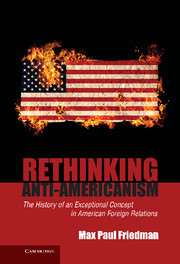4 - Bad Neighborhood
Anti-Americanism and Latin America
Published online by Cambridge University Press: 05 November 2012
Summary
The fascist and the Communist elements agree on at least one proposition. That is hatred of the Yankee…the time to deal with this rising menace in South America is now.
– Secretary of State John Foster DullesAs the Cold War intensified, Americans grew accustomed to reading events in the developing world through the lens of East-West conflict, colored by enduring assumptions of Third World inferiority. Foreign leaders and movements were regarded as either supporters of the Free World or agents of international communism, “pro-American” or “anti-American.” From a Latin American perspective, this schema made little sense. U.S. Marines had been landing on Caribbean beaches since long before the Bolshevik Revolution of 1917. Successive administrations in Washington intervened to make and unmake governments in Latin America under a variety of rationales: to promote stability, to thwart German influence, to teach democracy, to chase down bandits. By the time the Cold War became the central concern of U.S. foreign policy, there were already plenty of Latin American anti-communists in their own right – especially among business leaders, military officers, large landowners, and the Church – but although divisions between left and right were apparent in the internal political landscape, the notion of a Soviet threat to Latin America seemed hardly credible. For most Latin Americans, political conflict was about land tenure, access to political power, workers’ rights, and disputes with neighboring countries. When Latin Americans worried about subversion or interference by a foreign power, they did not look with apprehension to Moscow in the distant East, but to the nearby North. That is one reason the Cold War seemed so different from a Latin American perspective, and one more reason why the “anti-American” or “pro-American” labels were so ill-suited to the Americas.
- Type
- Chapter
- Information
- Rethinking Anti-AmericanismThe History of an Exceptional Concept in American Foreign Relations, pp. 123 - 156Publisher: Cambridge University PressPrint publication year: 2012
- 1
- Cited by



